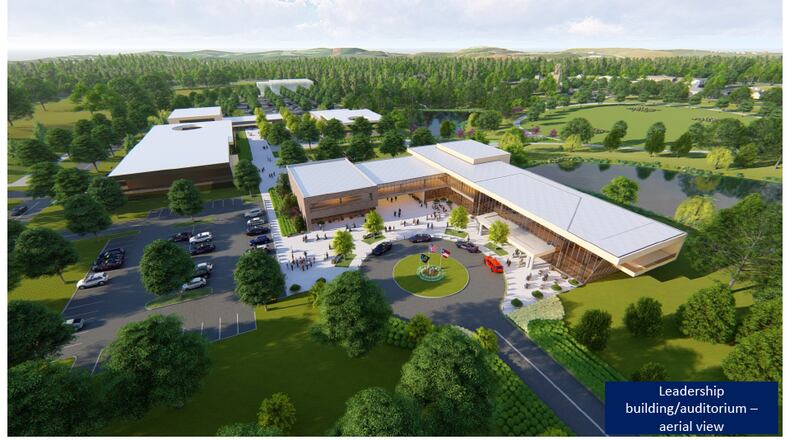This story has been updated to clarify that the Atlanta Police Foundation is seeking to build the new training center across 150 acres of land.
Atlanta city leaders chose to delay a vote on a new police training facility Wednesday night after public opposition swelled and protesters gathered outside a councilwoman’s home.
Over the next two months, the city is set to hold public hearings on the proposal to convert a large swath of forested land in DeKalb County into the new public safety center, officials said. The plan would involve leasing land off Key Road — the site of the old Atlanta prison farm — to the Atlanta Police Foundation for the construction of the training facility across 150 acres, according to a foundation spokesman.
More than 160 residents submitted nearly four hours of public comment during a City Council finance committee meeting, nearly all of which expressed opposition to the ordinance sponsored by Councilwoman Joyce Sheperd. Residents, environmental groups and organizations pushing to defund the police called on council members to vote no on the lease, citing its increased investment in the police force and the effects it could have on the surrounding neighborhoods and natural land.
Protesters also went to Sheperd’s home Wednesday afternoon, prompting the councilwoman to hold a hastily scheduled press conference. She was planning to speak outside the Atlanta police Zone 3 precinct, but her remarks were moved indoors after several protesters showed up to bang pans and chant “no cop city” outside the precinct. Sheperd doubled down on her support for the new training academy and threatened to press charges against future protesters on her property.
“People have a right to come out and say whether they’re for or against it,” she said. “But what they don’t have a right to do is come up on my private property, knock on my doors, protest on my lawn, on my porch. They don’t have that right. So I’m saying tonight that I’m still supporting the academy. I’m not scared.”
The city’s current police and fire academies, she said, are in “deplorable” condition. Police recruits will be trained at a nearby college before the new facility opens, Sheperd said.
Dave Wilkinson, the president and CEO of the Atlanta Police Foundation, said the center will be “an absolute game-changer” in boosting police morale, recruitment and retention. He noted that it will also include spaces for the public to have conversations about racial justice and police reform and policy.
Credit: Atlanta Police Foundation
Credit: Atlanta Police Foundation
“I think this training center will be the beacon for 21st century policing,” he said. “We’re not building this for police. We’re building this for the city of Atlanta.”
The measure has the support of Mayor Keisha Lance Bottoms. Council members on the finance committee decided Wednesday to hold off on voting on an ordinance that would lease the land to the police foundation, though several expressed support for a new facility.
“The goal moving forward is to gather additional public input to refine the site plan,” Atlanta Chief Operating Officer Jon Keen told the council members. The city is still finalizing the details for that process, but said it is expected to take place over the next two months.
The land is owned by the city but is located outside of Atlanta city limits in unincorporated DeKalb County, meaning nearby residents do not have formal representation in City Hall.
Scott Petersen, who has led tours through the prison farm for nearly 20 years, called the training center proposal a “travesty,” explaining that the farm’s “striking history and physical beauty” makes it an invaluable asset to residents. As its name suggests, the property was once used to house a prison where detainees worked off their sentences by producing food or doing other labor.
Credit: Phil Skinner
Credit: Phil Skinner
“It’s just terrible,” Petersen said. “We’re just proceeding at reckless speed, and without reform, without course correction, we’ll be making our situation worse.”
The center would be funded by a mix of private and public dollars involving the Atlanta Police Foundation and the city’s philanthropic community, Wilkinson said. Cox Enterprises President and CEO Alex Taylor, who also chairs the Atlanta Committee for Progress, is leading a campaign to raise private funds for the project. Cox Enterprises owns The Atlanta Journal-Constitution.
Officials say the state-of-the-art space will provide training, mid-career education, and practice with new technology and equipment for police and fire department personnel.
Preliminary renderings show the campus could house a mock city for police, fire and rescue teams to perform real world training. The center could also include indoor and outdoor shooting ranges, a fitness center, classrooms, an auditorium, and academy housing for public safety recruits. It would also provide some greenspace to the public, such as running trails, ballfields, and picnic areas, renderings show.
Credit: Ben Gray
Credit: Ben Gray
Sheperd said her proposal addresses the needs of her constituents in her southside district. But some area residents, like Jamal Taylor, said community members who support reduced police presence directly oppose the plan.
“We’ve had ongoing conversations with people in the Pittsburgh neighborhood specifically about interactions with the police, and this is nothing that they would support,” said Taylor, an organizer with the group Community Movement Builders. “Joyce Sheperd cannot make a statement saying this is in the best interest of the community.”
Other activist groups pushing for the city to reduce its investment in the police department have also staunchly opposed the plan.
“There is a lot of opposition to this from every progressive group in the city … and frankly, we’ve seen the City Council does not listen to public comments,” said Nolan Huber-Rhoades, an organizer with Defund APD, Refund Communities. “We want them to know that we are organized and we are mobilizing.”
The Latest
Featured







